- Home
- Deborah Harkness
Shadow of Night Page 43
Shadow of Night Read online
Page 43
feet. Her appearance on the Water Lane landing was treated as a public spectacle of enormous importance, and for a few moments a hush fell over our normally raucous street.
Mary looked serene and unperturbed when she finally stepped into the parlor, allowing Joan and a line of lesser servants to file in behind her.
“Henry tells me you are expected at court this afternoon. You have nothing suitable to wear.” With an imperious finger, Mary directed still more of her crew in the direction of our bedchamber.
“I was going to wear the gown I was married in,” I protested.
“But it is French!” Mary said, aghast. “You cannot wear that!”
Embroidered satins, luscious velvets, sparkling silks interwoven with real gold and silver thread, and piles of diaphanous material of unknown purpose passed by my nose.
“This is too much, Mary. Whatever are you thinking?” I said, narrowly avoiding collision with still one more servant.
“No one goes into battle without proper armor,” Mary said with her characteristic blend of airiness and tartness. “And Her Majesty, may God preserve her, is a formidable opponent. You will require all the protection my wardrobe can afford.”
Together we picked through the options. How we were going to make the necessary alterations so that Mary’s clothes would fit me was a mystery, but I knew better than to inquire. I was Cinderella, and the birds of the forest and the fairies of the wood would be called upon if the Countess of Pembroke felt it necessary.
We finally settled on a black gown thickly embroidered with silver fl e u r s - d e - l i s and roses. It was a design from last year, Mary said, and lacked the large cartwheel-shaped skirts now in vogue. Elizabeth would be pleased by my frugal disregard for the whims of fashion.
“And silver and black are the queen’s colors. That’s why Walter is always wearing them,” Mary explained, smoothing the puffed sleeves.
But my favorite garment by far was the white satin petticoat that would be visible at the front of the divided skirts. It was embroidered, too, with mainly flora and fauna, accompanied by bits of classical architecture, scientific instruments, and female personifications of the arts and sciences. I recognized the same hand at work as that of the genius who’d created Mary’s shoes. I avoided touching the embroidery to make sure, not wanting Lady Alchemy to walk off the petticoat before I’d had the opportunity to wear it.
It took four women two hours to get me dressed. First I was laced into my clothes, which were padded and puffed to ridiculous proportions, with thick quilting and a wide farthingale that was just as unwieldy as I had imagined. My ruff was suitably large and ostentatious, though not, Mary assured me, as large as the queen’s would be. Mary clipped an ostrich fan to my waist. It hung down like a pendulum and swayed when I walked. With its feathery plumes and ruby- and pearl-studded handle, the accessory was easily worth ten times what my mousetrap cost, and I was glad that it was literally attached to me at the hip.
The subject of jewelry proved controversial. Mary had her coffer with her and pulled out one priceless item after another. But I insisted on wearing Ysabeau’s earrings rather than the ornate diamond drops that Mary suggested. They went surprisingly well with the rope of pearls Joan slung over my shoulder. To my horror, Mary dismembered the chain of broom blossoms that Philippe had given me for my wedding and pinned one of the floral links to the center of my bodice. She caught the pearls up with a red bow and tied it to the pin. After a long discussion, Mary and Françoise settled on a simple pearl choker to fill my open neckline. Annie affixed my gold arrow to my ruff with another jeweled pin, and Françoise dressed my hair so that it framed my face in a puffed-out heart shape. For the final touch, Mary settled a pearl-studded coif on the back of my head, covering the braided knots that Françoise piled there.
Matthew, who had been in an increasingly foul mood as the hour of doom approached, managed to smile and look suitably impressed.
“I feel like I’m in a stage costume,” I said ruefully.
“You look lovely—formidably so,” he assured me. He looked splendid, too, in his solid black velvet suit of clothes with tiny touches of white at the wrists and collar. And he was wearing my portrait miniature around his neck. The long chain was looped up on a button so that the moon faced outward and my image was close to his heart.
My first glimpse of Richmond Palace was the top of a creamy stone tower, the royal standard snapping in the breeze. More towers soon appeared, sparkling in the crisp winter air like those of a castle out of a fairy story. Then the vast sprawl of the palace complex came into view: the strange rectangular arcade to the southeast, the three-storied main building to the southwest, surrounded by a wide moat, and the walled orchard beyond. Behind the main building were still more towers and peaks, including a pair of buildings that reminded me of Eton College. An enormous crane rose up into the air beyond the orchard, and swarms of men unloaded boxes and parcels for the palace’s kitchens and storerooms. Baynard’s Castle, which had always seemed very grand to me, appeared in retrospect a slightly down-at-the-heels former royal residence.
The oarsmen directed the barge to a landing. Matthew ignored the stares and questions, preferring to let Pierre or Gallowglass respond for him. To the casual observer, Matthew looked slightly bored. But I was close enough to see him scanning the riverbank, alert and on guard.
I looked across the moat to the two-storied arcade. The ground floor’s arches were open to the air, but the upper floor was glazed with leaded windows. Eager faces peered out, hoping to catch a glimpse of the new arrivals and obtain a morsel of gossip. Matthew quickly put his bulk between the barge and the curious courtiers, obscuring me from easy view.
Liveried servants, each one bearing a sword or a pike, led us through a simple guard chamber and into the main part of the palace. The warren of ground-floor rooms was as hectic and bustling as any modern office building, with servants and court officers rushing to meet requests and obey orders. Matthew turned to the right; our guards politely blocked his way.
“She’ll not see you in private before you’ve been draped over tenterhooks in public,” Gallowglass muttered under his breath. Matthew swore.
We obediently followed our escorts to a grand staircase. It was thronged with people, and the clash of human, floral, and herbal scents was dizzying. Everybody was wearing perfume in an effort to ward off unpleasant odors, but I had to wonder if the result was worse. When the crowd spotted Matthew, there were whispers as the sea of people parted. He was taller than most and gave off the same brutal air as most of the other male aristocrats I’d met. The difference was that Matthew really was lethal—and on some level the warmbloods recognized it.
After passing through a series of three antechambers, each filled to bursting with padded, scented, and jeweled courtiers of both sexes and all ages, we finally arrived at a closed door. There we waited. The whispers around us rose to murmurs. A man shared a joke, and his companions tittered. Matthew’s jaw clenched.
“Why are we waiting?” I said, my voice pitched so that only Matthew and Gallowglass could hear.
“To amuse the queen—and to show the court that I am no more than a servant.”
When at last we were admitted to the royal presence, I was surprised to find that this room, too, was full of people. “Private” was a relative term in the court of Elizabeth. I searched for the queen, but she was nowhere in sight. Fearing that we were going to have to wait again, my heart sank.
“Why is it that for every year I grow older, Matthew Roydon seems to look two years younger?” said a surprisingly jovial voice from the direction of the fireplace. The most lavishly dressed, heavily scented, and thickly painted creatures in the room turned slightly to study us. Their movement revealed Elizabeth, the queen bee seated at the center of the hive. My heart skipped a beat. Here was a legend brought to life.
“I see no great change in you, Your Majesty,” Matthew said, inclining slightly at the waist. “‘Semper eadem,’ a
s the saying goes.” The same words were painted in the banner under the royal crest that ornamented the fireplace. Always the same.
“Even my lord treasurer can manage a deeper bow than that, sir, and he suffers from a rheum.” Black eyes glittered from a mask of powder and rouge. Beneath her sharply hooked nose, the queen compressed her thin lips into a hard line. “And I prefer a different motto these days: Video et taceo.”
I see and am silent. We were in trouble.
Matthew seemed not to notice and straightened as though he were a prince of the realm and not the queen’s spy. With his shoulders thrown back and his head erect, he was easily the tallest man in the room. There were only two people remotely close to him in height: Henry Percy, who was standing against the wall looking miserable, and a long-legged man of about the earl’s age with a mop of curly hair and an insolent expression, who stood at the queen’s elbow.
“Careful,” Burghley murmured as he passed by Matthew, camouflaging his admonishment with regular thumps of his staff. “You called for me, Your Majesty?”
“Spirit and Shadow in the same place. Tell me, Raleigh, does that not violate some dark principle of philosophy?” the queen’s companion drawled out. His friends pointed at Lord Burghley and Matthew and laughed.
“If you had gone to Oxford and not Cambridge, Essex, you would know the answer and be spared the ignominy of having to ask.” Raleigh casually shifted his weight and placed his hand conveniently near the hilt of his sword.
“Now, Robin,” the queen said with an indulgent pat on his elbow. “You know that I do not like it when others use my pet names. Lord Burghley and Master Roydon will forgive you for doing so this time.”
“I take it the lady is your wife, Roydon.” The Earl of Essex turned his brown eyes on me. “We did not know you were wed.”
“Who is this ‘we’?” the queen retorted, giving him a smack this time. “It is no business of yours, my Lord Essex.”
“At least Matt isn’t afraid to be seen around town with her.” Walter stroked his chin. “You’re recently married, too, my lord. Where is your wife on this fine winter’s day?” Here we go, I thought as Walter and Essex jockeyed for position.
“Lady Essex is on Hart Street, in her mother’s house, with the earl’s newborn heir at her side,” Matthew replied on Essex’s behalf. “Congratulations, my lord. When I called on the countess, she told me he was to be named after you.”
“Yes. Robert was baptized yesterday,” Essex said stiffly. He looked a bit alarmed at the thought that Matthew had been around his wife and child.
“He was, my lord.” Matthew gave the earl a truly terrifying smile. “Strange. I did not see you at the ceremony.”
“Enough squabbling!” Elizabeth shouted, angry that the conversation was no longer under her control. She tapped her long fingers on the upholstered arm of her chair. “I gave neither of you permission to wed. You are both ungrateful, grasping wretches. Bring the girl to me.”
Nervous, I smoothed my skirts and took Matthew’s arm. The dozen steps between the queen and me seemed to stretch on to infinity. When at last I reached her side, Walter looked sharply at the floor. I sank into a curtsy and remained there.
“She has manners at least,” Elizabeth conceded. “Raise her up.”
When I met her eyes, I learned that the queen was extremely nearsighted. Even though I was no more than three feet from her, she squinted as though she couldn’t make out my features.
“Hmph,” Elizabeth pronounced when her inspection was through. “Her face is coarse.”
“If you think so, then it is fortunate that you are not wed to her,” Matthew said shortly.
Elizabeth peered at me some more. “There is ink on her fingers.”
I hid the offending digits behind my borrowed fan. The stains from the oak-gall ink were impossible to remove.
“And what fortune am I paying you, Shadow, that your wife can afford such a fan?” Elizabeth’s voice had turned petulant.
“If we are going to discuss Crown finances, perhaps the others might take their leave,” Lord Burghley suggested.
“Oh, very well,” Elizabeth said crossly. “You shall stay, William, and Walter, too.”
“And me,” Essex said.
“Not you, Robin. You must see to the banquet. I wish to be entertained this evening. I am tired of sermonizing and history lessons, as though I were a schoolgirl. No more tales of King John or adventures of a lovelorn shepherdess pining for her shepherd. I want Symons to tumble. If there must be a play, let it be the one with the necromancer and the brass head that divines the future.” Elizabeth rapped her knuckles on the table. “‘Time is, time was, time is past.’ I do love that line.”
Matthew and I exchanged looks.
“I believe the play is called Friar Bacon and Friar Bungay, Your Majesty,” a young woman whispered into her mistress’s ear.
“That’s the one, Bess. See to it, Robin, and you shall sit by me.” The queen was quite an actress herself. She could go from furious to petulant to wheedling without missing a beat.
Somewhat mollified, the Earl of Essex withdrew, but not before shooting Walter a withering stare. Everyone flurried after him. Essex was now the most important person in their proximity, and, like moths to a flame, the other courtiers were eager to share his light. Only Henry seemed reluctant to depart, but he was given no choice. The door closed firmly behind them.
“Did you enjoy your visit to Dr. Dee, Mistress Roydon?” The queen’s voice was sharp. There wasn’t a cajoling note in it now. She was all business.
“We did, Your Majesty,” Matthew replied.
“I know full well your wife can speak for herself, Master Roydon. Let her do so.”
Matthew glowered but remained quiet.
“It was most enjoyable, Your Majesty.” I had just spoken to Queen Elizabeth I. Pushing aside my disbelief, I continued. “I am a student of alchemy and interested in books and learning.”
“I know what you are.”
Danger flashed all around me, a firestorm of black threads snapping and crying.
“I am your servant, Your Majesty, like my husband.” My eyes remained resolutely focused on the queen of England’s slippers. Happily, they weren’t particularly interesting and remained inanimate.
“I have courtiers and fools enough, Mistress Roydon. You will not earn a place among them with that remark.” Her eyes glittered ominously. “Not all of my intelligencers report to your husband. Tell me, Shadow, what business did you have with Dr. Dee?”
“It was a private matter,” Matthew said, keeping his temper with difficulty.
“There is no such thing—not in my kingdom.” Elizabeth studied Matthew’s face. “You told me not to trust my secrets to those whose allegiance you had not already tested for me,” she continued quietly. “Surely my own loyalty is not in question.”
“It was a private matter, between Dr. Dee and myself, madam,” Matthew said sticking to his story.
“Very well, Master Roydon. Since you are determined to keep your secret, I will tell you my business with Dr. Dee and see if it loosens your tongue. I want Edward Kelley back in England.”
“I believe he is Sir Edward now, Your Majesty,” Burghley corrected her.
“Where did you hear that?” Elizabeth demanded.
“From me,” Matthew said mildly. “It is, after all, my job to know these things. Why do you need Kelley?”
“He knows how to make the philosopher’s stone. And I will not have it in Hapsburg hands.”
“Is that what you’re afraid of?” Matthew sounded relieved.
“I am afraid of dying and leaving my kingdom to be fought over like a scrap of meat between dogs from Spain and France and Scotland,” Elizabeth said, rising and advancing on him. The closer she came, the greater their differences in size and strength appeared. She was such a small woman to have survived against impossible odds for so many years. “I am afraid of what will become of my people when I am gone. Every day I
pray for God’s help in saving England from certain disaster.”
“Amen,” Burghley intoned.
“Edward Kelley is not God’s answer, I promise you that.”
“Any ruler who possesses the philosopher’s stone will have an inexhaustible supply of riches.” Elizabeth’s eyes glittered. “Had I more gold at my disposal, I could destroy the Spanish.”
“And if wishes were thrushes, beggars would eat birds,” Matthew replied.
“Mind your tongue, de Clermont,” Burghley warned.
“Her Majesty is proposing to paddle in dangerous waters, my lord. It is my job to warn her of that as well.” Matthew was carefully formal. “Edward Kelley is a daemon, as you know. His alchemical work lies perilously close to magic, as Walter can attest. The Congregation is desperate to keep Rudolf II’s fascination for the occult from taking a dangerous turn as it did with King James.”
“James had every right to arrest those witches!” Elizabeth said hotly. “Just as I have every right to claim the benefit should one of my subjects make the stone.”
“Did you strike such a hard bargain with Walter when he went to the New World?” Matthew inquired. “Had he found gold in Virginia, would you have demanded it all be handed over to you?”
“I believe that’s exactly what our arrangement stipulated,” Walter said drily, adding a hasty, “though I would, of course, have been delighted for Her Majesty to have it.”
“I knew you could not be trusted, Shadow. You are in England to serve me—yet you argue for this Congregation of yours as though their wishes were more important.”
“I have the same desire that you do, Your Majesty: to save England from disaster. If you go the way of King James and start persecuting the daemons, witches, and wearhs among your subjects, you will suffer for it, and so will the realm.”
“What do you propose I do instead?” Elizabeth asked.
“I propose we make an agreement—one not far different from the bargain you struck with Raleigh. I will see to it that Edward Kelley returns to England so that you can lock him in the Tower and force him to deliver up the philosopher’s stone—if he can.”
“And in return?” Elizabeth was her father’s daughter, after all, and understood that nothing in this life was free.
“In return you will harbor as many of the Berwick witches as I can get out of Edinburgh until King James’s madness has run its course.”
“Absolutely not!” Burghley said. “Think, madam, what might happen to your relationship with our neighbors to the north if you were to invite scores of Scottish witches over the border!”
“There are not so many witches left in Scotland,” Matthew said grimly, “since you refused my earlier pleas.”
“I did think, Shadow, that one of your occupations while in England was to make sure your people did not meddle in our politics. What if these private machinations are found out? How will you explain your actions?” The queen scrutinized him.

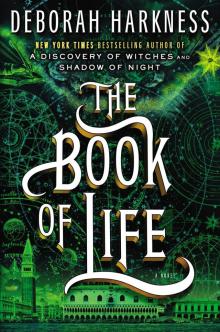 The Book of Life
The Book of Life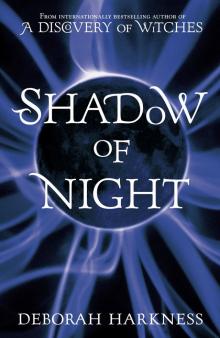 Shadow of Night
Shadow of Night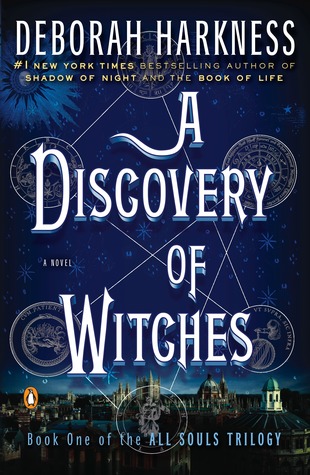 A Discovery of Witches
A Discovery of Witches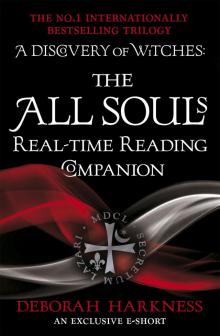 The All Souls Real-Time Reading Companion
The All Souls Real-Time Reading Companion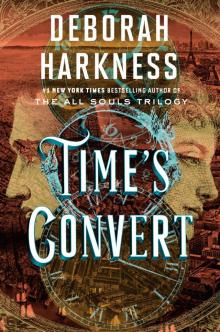 Time's Convert
Time's Convert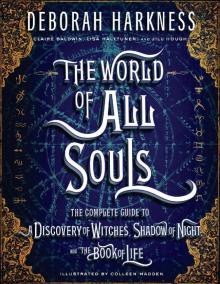 The World of All Souls
The World of All Souls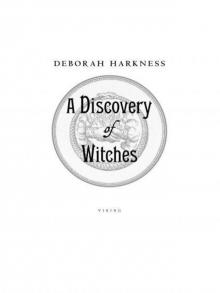 A Discovery of Witches: A Novel (All Souls Trilogy)
A Discovery of Witches: A Novel (All Souls Trilogy)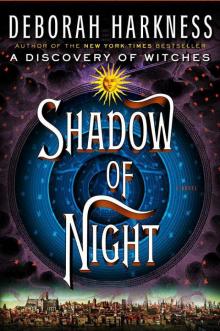 Shadow of Night: A Novel
Shadow of Night: A Novel